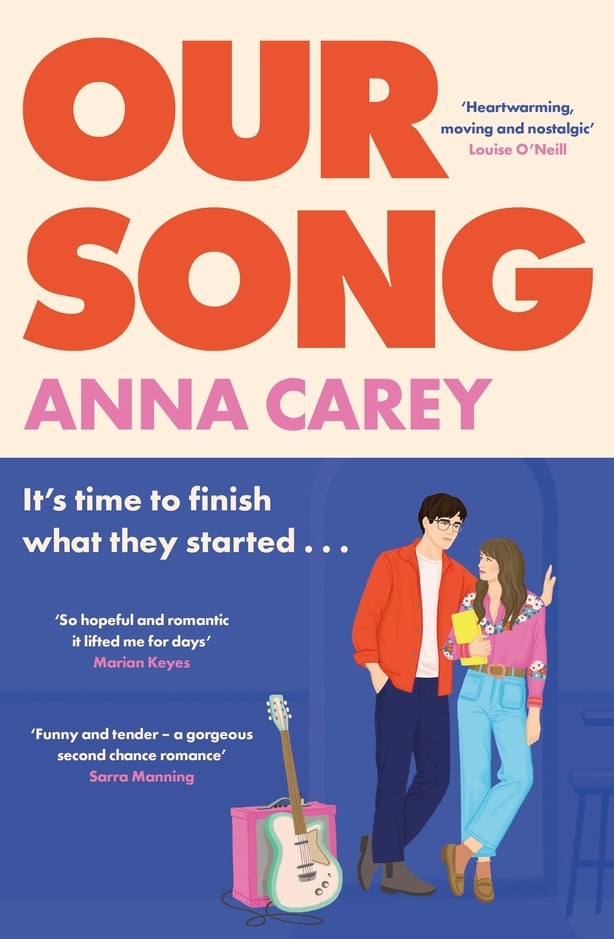Anna Carey, who has written seven young adult fiction novels, is already a reputable name in that genre, with her debut novel The Real Rebecca winning the Senior Children's Book of the Year at the 2011 Irish Book Awards. Most recently, her 2016 historical novel The Making of Mollie was adapted for the stage in 2024.
Our Song marks Carey’s first foray into fiction for adults, and what unfurls in this charming and compulsively readable novel is not just a tender love story, but one that harmonises with Carey’s real life story of musical romance.
The novel follows Laura, a marketing whiz whose life is upended in a swift one-two of being dumped by her fiancé and being "restructured" out of a job after her agency was bought out. The heartbreak is significant, and plays out in familiar patterns of online minefields and friends attempting to shield her from updates about her ex.
Living in her best friend’s spare room in Fairview and grieving the loss of a life she imagined for herself, Laura receives a request from former college bandmate-turned-megastar Tadhg Hennessy, asking if she would continue working on a song they started but never finished in college.
It’s a compelling spin on the friends-to-lovers trope, and one that not only captures the bone-deep sense of yearning for a crush, but also how that crush shifts and morphs over time, and what it feels like to reconnect with a significant person from your past.
Laura and Tadhg first cross paths, in a sense, when she spots him busking outside the A-Wear shop on Grafton St in 1999. As enraptured by his musical skill as his looks, Laura immediately establishes a pattern of gentle, teenage stalking with her friend Katie, the pair making the weekly pilgrimage to watch Tadhg’s band perform every Saturday.
Carey has also hooked into the untapped resource for drama that is the Gaeltacht experience, with those chapters especially enjoyable to read. It is there that the pair officially meet and soon find themselves in a band together, collaborating on songs and stealing moments together for impassioned conversations about music.
Carey’s portrayal of this young infatuation is exactly as it should be: heightened, heartfelt and all-consuming. "That’s the thing about a proper crush: it adds a pinch of glitter to everyday life", she writes. When Laura and Tadhg lose touch before going to university, and then again after that, the loss isn’t just that of a crush or a friend, but of a kindred spirit. Carey astutely captures what it means to be understood creatively, and to have a space to channel those impulses, especially in your early 20s.
The novel is partly inspired by the story of how Carey met her own husband, having formed a band in college, and her understanding of both band culture in Ireland and the process of collaborating with a loved one is palpable.

Carey’s voice is clear and believable, and she artfully channels the self depreciation of older teens, which then matures into the older voice of the protagonist. Despite 20 years passing between the dual timelines of the novel, Laura remains both familiar and changed by the events of the past two decades. When the chance to work on music again with her first and best collaborator arises, her reawakened hope that it could lead somewhere is moving.
It’s not without its challenges, however: reconnecting with Tadhg highlights the differences between them as well as the core similarities. Although Laura comes to work with him in his expensive home in Marino’s historic Crescent, she’s struck by the chasm of difference between their lives, and the complicated dynamic that presents: "Tadhg and I aren’t the same anymore", she thinks. "And I can’t be won over by a little trip down memory lane."
When a tabloid outs their collaboration, Laura is swiftly cast as "Saint Tadhg’s Cinderella", a charity case.
Thrumming underneath the novel like a bass line is a subtle and affecting reflection of how we shift as we age, and how when faced with people from our past, we can splinter into different selves. There’s the self we present to the world at large, and the self we reserve for ourselves or only our most trusted friends.
It happens for Tadhg early on as he becomes known as Tadhg to Laura and her friends - the name he went by in the Gaeltacht when they met - and Tim to his family and larger college friends. It’s telling, then, that he chose Tadhg as his stage name.
In this way, Our Song is also the story of a woman rediscovering herself, and trying to find harmony between her past self and her present self.

